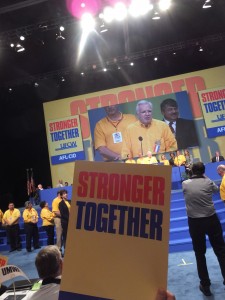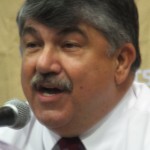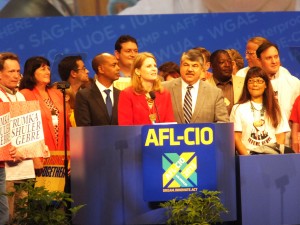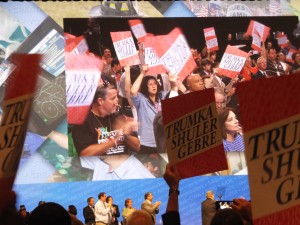
By ED FINKELSTEIN
Publisher
(EDITOR’S NOTE: This is the first in series of stories to be published over the next few weeks that will detail results of the historic AFL-CIO Convention in Los Angeles last Sept. 8-11. This first story is an overview of convention actions; future stories will provide essential details.)
Los Angeles – The National AFL-CIO convention Sept. 8-11 could well be one of the most “shake things up” conventions designed to strengthen the clout of the Middle Class or it could do just the opposite – create situations that could spiral the labor movement into further decline. It will be sometime before the outcome is clear.
The AFL-CIO made a series of far-reaching changes that will govern the federation’s direction and adopted resolutions that bode well for both re-invigorating America’s Middle Class and growing the labor movement as the springboard for a brighter future for all workers. An overview of those actions:
A ‘NEW’ AFL-CIO
• EXPAND the AFL-CIO’s reach by opening membership and/or affiliation to community allies who are also fighting for Middle Class values for all workers, groups such as the civil rights, women’s rights, Latino, lesbian-gay-bisexual transgender groups, immigrant rights, environmentalists and many others to transform the AFL-CIO into a labor movement not just a federation of labor unions.
“We must begin, here and now, today, the great work of reawakening a movement of working people – all working people,” said AFL-CIO President Richard Trumka.
Pointing out that unions only represent a small portion of the 150 million Americans who work for a living, he added: “We can’t win economic justice only for ourselves, for union members along. It’s just not possible right now. All working people will rise together, or we will keep falling together.”

How that will be accomplished is yet to be finalized. Many controversial issues need to be solved: voting rights, funding, coordination of efforts, handling of policy disagreements when they arise, and they will.
• TOUGH new requirement for State and Local Labor Councils to step up and contribute more to the aggressive AFL-CIO agenda of building community partnerships.
The AFL-CIO will create a task force to review all central bodies and determine and disseminate “best practices,” for training and evaluation programs. Additionally, they will develop criteria for judging council efforts and provide assistance, guidance and possibly funding, where creating and implementing community partnership programs are lacking.

• RE-ORIENT 2014’s political focus to state governor and legislative races to offset the worker-wrecking carnage that all working families have faced since the 2010 GOP-dominated elections turned control of many state legislatures over to anti-union, anti-worker Republican and Tea Party zealots determined to promote the interests of the 1% and not the 99%.
Heralding a tough new stance, Trumka stressed: “There are many representatives in the Democratic Party who are friends of labor, and some who are acquaintances and some who are less than acquaintances.
“We’ll work with people and candidates that support us. When they are right, we’ll support them, and when they’re not we’ll oppose them.”
• INITIATE new and invigorated campaigns to register, mobilize and then get out the vote to support progressive candidates for state legislatures and governor seats and to protect the U.S. Senate where Democrats have a 54 – 46 majority.
• DISPUTE resolution on a more affirmative basis. Trumka will assume the responsibility for more effectively resolving inter-union conflicts before they become public.
Trumka’s efforts here will be important because such disputes can negatively impact organizing success and also can lead to unions pulling out of the federation.
This happened just as the convention began when the International Longshore & Warehouse Union (ILGWU) withdrew from the AFL-CIO over alleged raiding disputes on the docks by other AFL-CIO affiliates.
LOOKING TO THE FUTURE

• ELECTED a young, dynamic “going-to-shake-things-up” immigrant to the federation’s third highest office – executive vice president – Tefere Gebre. He replaces retiring Arlene Holt Baker who received a standing ovation from the almost 1,000 delegates and visitors for her 18 years of service to the AFL-CIO, the last six as the first woman African American executive officer.
“We’re on the verge of creating a labor movement that speaks for all workers. It doesn’t matter if you have a (union) card in your pocket or not,” Gebre said enthusiastically.
• CHALLENGE the implementation of the new Affordable Health Care Act (ACA), “Obamacare,” as it’s now written because of its potential negative impact on multi-employer health care funds and creating a situation where companies might either kill their existing health care plans or reduce workers hours to part-time to force employees into the new federal program in a move to relieve the companies of their health care costs.

Multi-employer plans that cover 20 million workers will have a massive new multi-year graduated tax imposed on them to help pay for the new national health care program while some employer categories have been given waivers creating an unfair situation.
A resolution called for the law to be fixed for fairness. If it’s not, labor’s opposition will mount, and do so decisively.
“If the ACA is not fixed, if it destroys the health and welfare funds we fought for, (then) it needs to be repealed,” said Laborers International President Terry O’Sullivan. He was voicing the discontent of a number of International Unions, notably the United Food & Commercial Workers and the Teamsters, that have already publically criticized the new law as being unfair to union families.
• LAUNCH a campaign to change the federal bankruptcy laws that are being used by companies to destroy labor contracts, laws that favor company and investor profits over the lives of workers.
• CHANGE federal labor laws by seeking fundamental changes in the National Labor Relations Act, the nation’s basic labor law.
Looking to restore a level of balance that now favors companies, the federation wants to extend labor law coverage to millions of workers, open up workplaces to union access, bar the “captive-audience” meetings, outlaw the phony “right-to-work (for less) laws, speed up union elections, substantially increase penalties for violations and mandate supervised bargaining for a first contract, which, if stalled, would go to binding arbitration.
Given the current make-up of the U.S. Congress, everyone agrees this will be a tall order to make happen.
• RECRUIT and train progressive candidates for office, hopefully many will have a union card, but that will not be a prerequisite.
In Orange County, Calif., under the leadership of Gebre, the labor council there established a five-hour training program for all candidates; the federation’s endorsement depends on completion of the program designed to educate candidates on workers’ issues.
• IMMIGRATION reform now to help all workers.
The Republican-controlled House of Representatives has refused to consider any meaningful changes for the more than 11 million undocumented workers who are the mainstay of many essential parts of our economy, notably agriculture.
On Oct. 5 there will be comprehensive reform demonstrations in 60 cities followed by a massive demonstration in Washington on Oct. 8.
Reform is needed, said AFSCME President Lee Saunders, to protect workers from employers who use the threat of deportation to force low pay, unsafe working conditions and in many cases, cheating workers of their pay entirely. This downward pressure also impacts workers in industries where unions do have a foothold like restaurants and hotels.
EXPANDED ORGANIZING
• STRONGER emphasis on coordinated organizing. Effective Jan. 1 next year, the AFL-CIO will require national unions to annually submit organizing plans to the federation.
“These plans will include areas of focus, resource commitments, strategies and tactics and a projected time line,” noted the convention resolution.
The AFL-CIO will use them to set priorities for money and foot-soldier aid to unions, to identify and solve inter-union conflicts and to “identify opportunities for multi-union collaboration.” The AFL-CIO will commit financial aid and staff resources if the unions involved have already made “significant commitment on their own” to specific organizing campaigns.
• EXPANSION of Worker Centers that have been used effectively in many states to help unorganized workers come together and make gains in working conditions and wages. Some groups go on to form a union or affiliate with an existing union.
Car washers in Los Angeles and taxi drivers in New York were highlighted as examples of successful campaigns in untraditional industries that used help and organizational skills provided by the Worker Centers as the focus for their successful efforts.
OTHER ACTIONS

• RE-ELECTED Trumka, incumbent Secretary-Treasurer Liz Schuler and 45 vice presidents. Ten new vice president positions were authorized to expand the AFL-CIO’s Executive Council to 55. The council reports to the General Board. Additionally, eight more seats were authorized to allow new community partners brought in by the expansion of the AFL-CIO to have a seat on the Executive Council.
• ADDED A YOUNG PERSON to the AFL-CIO’s General Board to represent the issues important to the next generation of trade unionists. That person will be selected by the federation’s Young Person Advisory Committee.
• WELCOMED back into the AFL-CIO the 1.3 million member United Food & Commercial Workers International Union (UFCW) who was a founding member of the Change to Win Federation (CTW), a separate group of five international unions that left the AFL-CIO in 2005 over allocation of resources issues. Since then, two other international unions besides the UFCW have returned to the AFL-CIO: UNITE-HERE in 2009 and the Laborers in 2010. Only the Teamsters, Service Employees International Union (SEIU) and the Farm Workers remain in CTW.

“We’re home,” said UFCW President Joe Hansen after leading a huge delegation of gold-shirted members through hundreds of cheering delegates welcoming them back to the AFL-CIO.
“We join the AFL-CIO because it is the right thing to do for UFCW members, giving them more power and influence…It is about joining forces to build a more united labor movement that can fight back against the corporate and political onslaught facing our members each and every day.”
• EXPAND the AFL-CIO’s Super PAC, “Workers Voice” to reach out and educate non-members. The Supreme Court’s ruling allowing corporations and unions to spend unlimited funds legitimatized these PACs.
• PER CAPITA reviews will be conducted in the coming months to determine if a per capita increase is needed to fund the AFL-CIO’s aggressive agenda. It was noted that financial stability has been restored to the federation but that new funds could well be needed to carry out the new mandates of the convention.
(Some information for this report provided by Mark Gruenberg, Press Associates Union New Service.)

